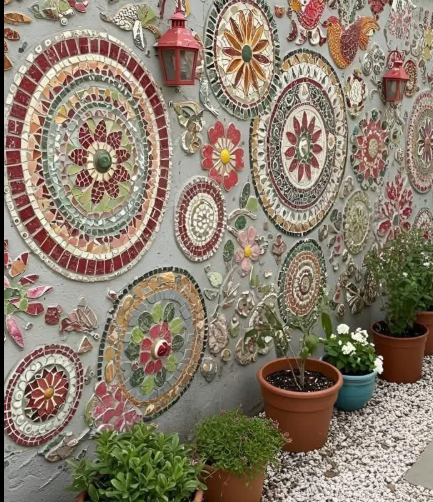The Soul Wall: Turning Broken Tiles into Color and Connection
Table of Contents
- Introduction: A Home Depot Breakdown and a Broken-Tile Breakthrough
- 1. Historical & Cultural Roots of Mosaic Art
- 2. In-Depth Chemistry: Grout, Adhesives & Colorfast Pigments
- 3. Step-by-Step Tile Upcycling Tutorial
- 4. Extended Case Studies: Community, Craft & Connection
- 5. Troubleshooting & Pro Tips
- 6. Garden & Landscape Design Around the Soul Wall
- 7. FAQs
- Conclusion: Flooding the Gray with Color
Introduction: A Home Depot Breakdown and a Broken-Tile Breakthrough
…(Your heartfelt narrative goes here)…
1. Historical & Cultural Roots of Mosaic Art
- Ancient Egypt (c. 2000 BCE): Inlaid faience tiles in pharaonic temples—color as spiritual symbolism.
- Byzantine & Roman Mosaics (4th–6th century CE): Tesserae telling communal and religious stories in public spaces.
- Islamic Tilework (8th–15th century): Geometry, vibrant glazes and tessellation traditions across North Africa and Spain.
- 20th-Century Rebirth: Gaudí’s Park Güell mosaics in Barcelona; mid-century Trafalgar Square art installations.
2. In-Depth Chemistry: Grout, Adhesives & Colorfast Pigments
| Component | Chemistry & Purpose | Key Tips |
|---|---|---|
| Epoxy Tile Adhesive | Two-part resin + hardener; strong bond, water-resistant | Mix exact ratio; apply within pot life |
| Portland Cement Grout | Calcium silicates + gypsum; binds, resists compression | Use polymer additive for flexibility |
| Color Pigments | Iron oxides, ultramarine dyes; UV-stable ceramic stains | Pre-mix with grout to avoid streaks |
3. Step-by-Step Tile Upcycling Tutorial
- Gather Materials: Broken dishes, old tiles, tile adhesive, grout, nippers, safety gear.
- Design Your Pattern: Sketch on paper, transfer outline to wall or base panel.
- Prepare Substrate: Clean wall/board, apply primer or mesh backing.
- Cut & Lay Tesserae: Use tile nippers to shape pieces; press into wet adhesive following your sketch.
- Grouting: Once adhesive cures, apply grout with rubber float; wipe excess after 10–15 minutes.
- Sealing: After grout cures, seal both tiles and grout to protect from moisture.
- Final Reveal: Clean surface, buff for shine, hang string lights or planter accents.
4. Extended Case Studies: Community, Craft & Connection
| Project | Location | Outcome | Quote |
|---|---|---|---|
| “Soul Wall” Backyard Mosaic | Suburban Philadelphia, PA | Neighborhood landmark; weekly flower-pot offerings | “Every circle is a season I survived.” |
| Community Center Mural | São Paulo, Brazil | Local crafters co-created; youth workshops | “Our broken plates found new life.” |
| Transit Station Art | Sicily, Italy | Tiles shipped by Tedooo artisans, integrated regional motifs | “It turned a gray platform into home.” |
5. Troubleshooting & Pro Tips
| Issue | Cause | Solution |
|---|---|---|
| Tesserae falling off | Insufficient adhesive or damp surface | Re-clean substrate; use epoxy for heavy pieces |
| Grout cracking | Movement in substrate; no primer | Use flexible grout; add bonding agent |
| Uneven grout color | Poor mixing; water ratio off | Pre-mix pigment; follow manufacturer’s water spec |
6. Garden & Landscape Designs
6.1 Mosaic Planter Walls
Build raised beds with mosaic front panels. Plant shade-tolerant ferns and hostas around the base to soften edges and maintain humidity for grout longevity.
6.2 Color-Themed Path Borders
Create mosaic stepping-stone inserts in pathways—use seasonal flower colors. Surround with creeping thyme (drought-tolerant) to cushion each stone.
6.3 Living Wall Backgrounds
Install mosaic panels on fences and drape with climbing vines (e.g., jasmine, clematis). Light-drenched mornings help grout cure; vines protect from direct rain.
7. Frequently Asked Questions
- Q: How long does the mosaic last outdoors?
- A: With proper sealing and flexible grout, 10–15 years in temperate climates.
- Q: Can I reuse kitchenware without lead glazes?
- A: Only use untreated, food-safe ceramics. Avoid vintage pieces unless tested.
- Q: What if I lack tile nippers?
- A: Score glass with a carbide cutter and snap; use masonry chisels for thicker tiles.
Conclusion
Your mosaic wall—born from Home Depot tears and fueled by global connections—becomes a living testament to resilience and forgiveness. By weaving historical craft traditions, modern chemistry know-how, and community stories together, you’ve built not just art, but bridges between hearts. Now go forth, break more plates, match more colors, and let every shard you piece together bring people back home.
